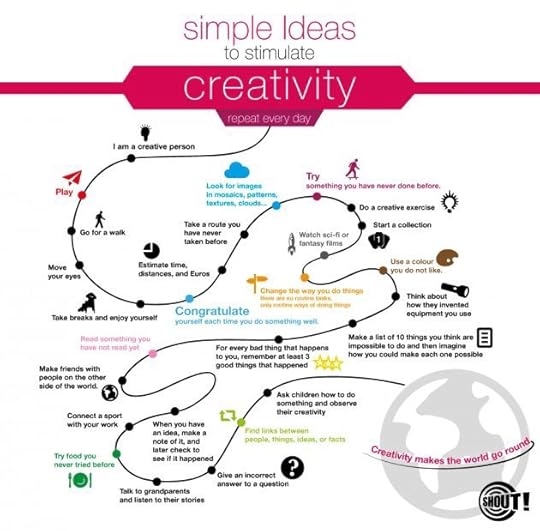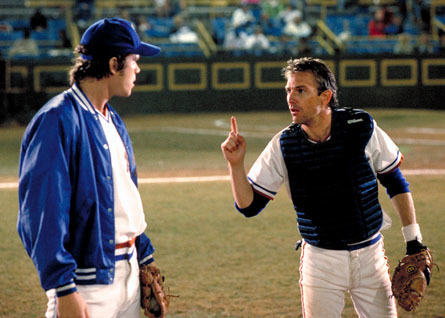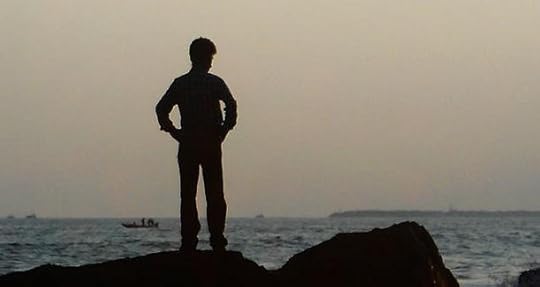Richard Harris's Blog, page 47
October 1, 2016
Quote of the Day
She wasn’t doing a thing that I could see, except standing there leaning on the balcony railing, holding the universe together.”
—J. D. Salinger, A Girl I Knew


September 30, 2016
A Guide to Writing Prizes for Canadians & International Citizens
The CBC has put together a great list of writing contests open to Canadians (many are also open to people from around the world) in the fields of fiction, non-fiction, and poetry. Most of these contests have an entry fee, but there are a few that are free.
Due to the fact that I am extremely generous (and humble), I would ask that anyone who enters a writing contest after reading this post and wins a cash prize donate half of said monies to the Richard H. Harris Official Site Foundation, one of the most prestigious and philanthropic organizations in our galaxy.
Good luck to all writers and poets!


September 29, 2016
Quote of the Day
After a crappy day of crappy rain here in Toronto, and in the spirit of GO JAYS GO, one of my favourite quotes from one of my favourite baseball movies:
“A good friend of mine used to say, ‘This is a very simple game. You throw the ball, you catch the ball, you hit the ball. Sometimes you win, sometimes you lose, sometimes it rains’. Think about that for a while.”


Creative Freelancer Event

From my good friend @jaclynlaw, a great opportunity to take your creative freelancing career to the next level. Per the tweet:
This Saturday! If you’ve been thinking about going freelance, don’t miss this #CultureDays event with @PWACToronto @EditorsToronto @RGD


September 28, 2016
Quote of the Day
An oldie but a goodie from Sir Winnie:
“Success is the ability to move from one failure to another without loss of enthusiasm”


Keys to Increasing Creativity

Larry Kim wrote a very direct and useful guide for ways in which to increase your creativity. Essentially, he reminds us that the brain is a muscle. Ergo, treat it like your bis, tris, delts, quads, etc. Work it out on a daily basis and aim to make it stronger by constantly pushing it to its limits.
His piece is directed as much at artists as it is at scientists and business people. You can read the full article here, but I’ll summarize his nine points below.
1. Learn through Collaboration
Talk to and learn from others, especially when you get stuck being innovative and creative. Curiosity may have killed the cat, but it also leads to creativity.
2. Do Something You Love
As Einstein once wrote to his son about playing the piano, “That is the way to learn the most, that when you are doing something with such enjoyment that you don’t notice that the time passes.”
Love and creativity are one and the same.
3. Find Inspiration from Other Industries
Don’t imitate, innovate. Finding that elusive je ne sais quoi can sometimes be found in a completely different field or area of industry.
4. Unplug (Or Just Do Nothing)
Bestselling author Alan Cohen (Why Your Life Sucks) once wrote, “There is virtue in work and there is virtue in rest. Use both and overlook neither.”
5. Walk
Research shows that walking heightens creativity. Stephen King has long known that (which is also how he got hit by a car and nearly died), but today major business leaders will hold “walking meetings” because they realize the value of this simple yet healthy way to flex that muscle between your ears.
6. Set the Right Mood
Listen to music. Personally, I listen to music when I write, edit, translate, send emails or do anything connected to work.
As the German philosopher Arthur Schopenhauer once said, “The inexpressible depth of music, so easy to understand and yet so inexplicable, is due to the fact that it reproduces all the emotions of our innermost being, but entirely without reality and remote from its pain… Music expresses only the quintessence of life and its events, never these themselves.”
7. Use the Six Thinking Hats Technique
As Larry Kim put it, “Sometimes you just need to start over. Forget everything and begin anew with a blank slate — break it down using six different colored ‘thinking hats’.
Using this process could help you look at things in a different way. It gives you the option to look at things in a “just the facts” manner (white hat); where things could go wrong (black hat); and possibilities, alternatives, and new ideas (green hat), for example.”
8. Ask For Advice or Feedback
Ditch the insecurity. If you’re insulted or scared to ask for advice or suggestions from peers/friends/colleagues/family members, follow Australian comedian Chopper Reid’s advice and harden the **** up.
9. Pick a Terrible Idea
Larry Kim explains: “Step away from whatever idea you’re stuck on for a few minutes. What’s the most useless idea you can imagine? Make a list of the worst ideas you can think up.
Now the real challenge to stretch your creativity: What are the best features of these terrible ideas?”


September 27, 2016
8 Books That Will Make You Laugh…
…When Politics Makes You Want to Cry.
Interesting (and eclectic) list of books from offtheshelf.com related to the above title.


Verbicide
I love linguistics, and while this is by no means a political blog, I can’t help but share one thought I had after watching last night’s first presidential “debate” (i.e. bareknuckle oratory slugfest). Politicians are generally cut from the same cloth in that they turn the act of lying into an art and consistently mislead the public. Fine and dandy. The whole world has come to expect this of the people who run our governments.
But last night, DJT took this pattern of behaviour to a new level: He committed verbicide. For those not familiar with the noun, here’s the dictionary definition:
1. the willful distortion or depreciation of the original meaning of a word.
2. a person who willfully distorts the meaning of a word.
Some choice examples from last night include, but are not limited to, the following:
[on pretty much everything stated by Hilary that was backed up with hard evidence]
“Wrong. Wrong. You’re wrong.” = Yes. Yes. You’re right.
[on his tax plan being a job creator]
“It’s going to be a beautiful thing to watch.” = You will lose the shirt off your back. Then you will shit the bed. Many times over.
[on how he will get American manufacturers to come back to the U.S.]
“…my father gave me a very small loan in 1975 and I built…a company that’s worth many, many billions of dollars ” = My father came to my rescue many times with numerous handouts.
[on climate change being a “hoax.”]
“I did not — I do not say that” = You’re right. I tweeted that in 2012 and on December 30, 2015, I did tell the crowd at a rally in Hilton Head, S.C. that climate change is a hoax.
“No wonder you’ve been fighting ISIS your entire adult life.” = I can’t believe you’ve been fighting ISIS since 2013.
Anyway, I could go on and on like the Energizer bunny, but I’ll leave DTJ’s verbicide tendencies at that. If we’re lucky, his next step in the campaign will be to aim his crosshairs at neologism (the introduction of a new word into a language) and we’ll all get to take our lexicons to new heights.
Wouldn’t that be great! = I’m genuinely scared for the future of the English language!


September 26, 2016
2016 Giller Prize Shortlist
September 25, 2016
Is It Impolite to Be Introverted?
In his political philosophy work entitled Politics, Aristotle wrote, “Man is by nature a social animal; an individual who is unsocial naturally and not accidentally is either beneath our notice or more than human. Society is something that precedes the individual. Anyone who either cannot lead the common life or is so self-sufficient as not to need to, and therefore does not partake of society, is either a beast or a god.”
However, in a piece by K.J. Dell’Antonia in The New York Times entitled “Am I introverted, or Just Rude?“, the NYT columnist and contributing editor examines the whole social animal question in a somewhat different light. Apparently impacted by the critically acclaimed book by Susan Cain called Quiet: The Power of Introverts in a World That Can’t Stop Talking, Ms. Dell’Antonia muses:
“Suddenly, a resistance to social intercourse became, not just acceptable, but cool.”
Ms. Dell’Antonia goes on to pose the following question: “Life is largely lived among acquaintances and strangers. So many fall into problematic categories: some appear different or unapproachable, some we actively dislike, some we’ve failed to connect with in the past. What do we have to gain from even trying?”
She goes on to answer her own question, stating that there is a lot to be gained from social interaction: “Extending ourselves can actually be good for us. We forget that we don’t always know what makes us happy. We predict that we prefer solitude on our commute, for example, but consistently report a more positive experience when we connect with a stranger.”
Like my last post on mental health with freelancers, artists and entrepreneurs, these same vocations necessarily call for spending long stretches of time on your own if you’re to be successful. There’s also a tendency to become more isolated – and by extension more introverted – the longer you are involved in one of these fields of work. As you grow older, this only makes it more difficult to branch out and socialize, either with old friends and family members or with strangers. The onus, therefore, falls on us to maintain our “social animal” status.
Just like the famed Greek philosopher, Ms. Dell’Antonia ends her piece by concluding that being unsocial (the words “antisocial” and “loner” just seem so much more negative) is not a good thing (unless you’re a god, of course), and essentially uses the same comparison to Aristotle’s beast, if in a more politically correct way, saying:
“There are many excuses for failing to conduct ourselves with courtesy, for avoiding gatherings and conversations we don’t think we will enjoy, or for just putting on our pajamas and staying home. Too many of them boil down to just that one thing: We care more about ourselves than about the needs of others. That’s not about introversion. It’s just an ordinary version of selfishness.”
P.S. Click on the following link to watch Susan Cain’s TED Talk.















